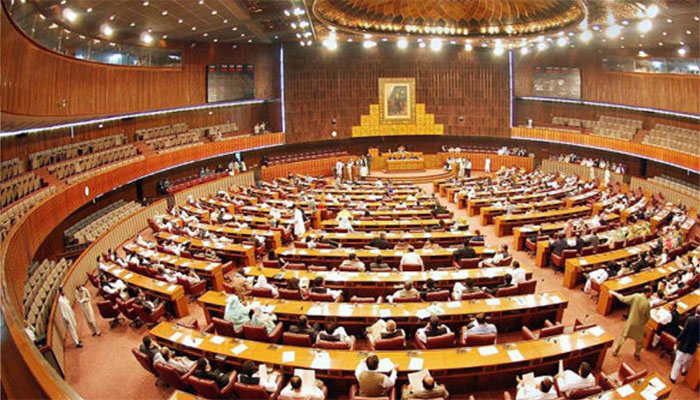Govt determined to get electoral reforms passed
ISLAMABAD: The government is all set to present its electoral reforms package, rejected by the Senate standing committee, in the joint session of Parliament where it has a simple majority.
Even after the dismissal of the amendments by the Senate or its concerned committee, they can be taken to the joint sitting of the two Houses assembled together under the rules. The government has been campaigning since long for 72 amendments to the Elections Act, 2017, which the National Assembly had passed on June 10 amid an opposition protest.
Five key amendments, which the Senate committee disposed of, related to the electronic voting machines (EVMs), i-voting for overseas Pakistanis, open ballot in place of secret vote in Senate elections, mandatory oath-taking by a legislator-elect within 60 days of his election and holding of regular annual conventions by political parties and submission of such reports to the Election Commission of Pakistan (ECP).
Through a person-specific amendment, it had been envisaged that Senator-elect and former Finance Minister Ishaq Dar of the Pakistan Muslim League-Nawaz (PMLN) -- who was elected in 2018 and had not taken oath as he had to go to London, where he is still based, in connection with his treatment-- would be unseated and Finance Minister Shaukat Tarin would be elected in his place. An unelected minister can retain the cabinet position for only six months under the Constitution.
The government had easily passed the amendments in the National Assembly on the force of its majority and had anticipated roadblocks in the opposition-dominated Senate. However, it had not foreseen the rejection of the electoral reforms even in the Senate committee, where it had beefed up its strength by inducting Samina Mumtaz Zehri belonging to the Balochistan Awami Party (BAP).
Had she been present during the voting, ordered by committee chairman Taj Haider of the Pakistan People’s Party (PPP), there would have been a tie. Then, a question would have risen about the result and there would have been numerous interpretations.
Interestingly, at another forum – the Judicial Commission of Pakistan (JCP) - in case of an equal number of votes there, the nomination of the first-ever woman judge to the Supreme Court stands stalled.
Seven senators including Samina Mumtaz Zehri, Azam Swati, Sania Nishtar, Dr Farogh Naseem, Walid Iqbal, Syed Ali Zafar and Hilalur Rehman, an independent from the former tribal areas, back the government in the committee.
An equal number of senators - Taj Haider, Kamran Murtaza, Azam Nazeer Tarar, Farooq H Naek, Mustafa Nawaz Khokhar, Prof Sajid Mir and Abida Azeem – supported the opposition. The committee chairman casts his vote only in case of a tie.
The advantage of having its own chairman of the committee was underscored as opposition senator Taj Haider, who headed the panel, called for voting, prompting the government senators to stage a walkout although the official side did not want the process to be held. Its importance was further highlighted as Taj Haider refused to allow the absent Samina Mumtaz Tarar to cast her vote online.
A day earlier, the opposition senators had objected to the induction of Samina Mumtaz Zehri in the committee by Senate Chairman Sadiq Sanjrani to beef up the government side’s strength.
The proceedings of the standing committee presented scenes of high drama marked by two walkouts, one by the government members and the other by ECP officials against Azam Swati’s remarks against the ECP. “Such institutions [like the ECP] should be burned down; go to hell; the ECP has caused destruction of democracy in Pakistan; the ECP has taken bribes; the ECP should be deleted from the Constitution and the government should be empowered to hold elections,” the railways minister said. His remarks provoked the ECP officials to walk out of the committee room.
The reaction of the ECP, which will be firmed up in its meeting on Monday and publicly released, is likely to match the minister’s diatribe. Swati’s tirade reflected the sentiments prevailing among official quarters about the ECP’s 37 objections to the EVMs.
The Senate secretariat notice summoning the three-day meeting of the committee had stated that the forum was bound to present its report to the House on or before Sep 12. The committee would lay in the Senate its report that would say that it has rejected the two government-sponsored bills that sought amendments in the Elections Act. The purpose of fixing the deadline reflects the urgency that the government is experiencing to pass the electoral reforms.
As per the rules of procedure and conduct of business in the Senate or National Assembly, the House acts on whatever report the concerned committee presents about a bill. The House accepts its findings.
Swati’s criticism of the ECP and subsequent denunciation of Chief Election Commissioner (CEC) Sikandar Sultan Raja by Information Minister Fawad Chaudhry describing him as a “mouthpiece, tool of small opposition parties” was apparently intended to force him to bow out.
-
 Nepal To Vote In First Election Since Gen Z-led Protests Ousted Government
Nepal To Vote In First Election Since Gen Z-led Protests Ousted Government -
 Megan Fox Breaks Social Media Silence: 'I'm Alive'
Megan Fox Breaks Social Media Silence: 'I'm Alive' -
 Prince William Relying On TWO Royals For ‘valuable Support’
Prince William Relying On TWO Royals For ‘valuable Support’ -
 Demi Lovato Gets Honest About Her 'bratty' Behavior During Disney Days
Demi Lovato Gets Honest About Her 'bratty' Behavior During Disney Days -
 Megan Fox Makes Blunt Admission About Never Loving Her Body?
Megan Fox Makes Blunt Admission About Never Loving Her Body? -
 Princess Diana Relished THIS British ‘comfort Food’, Reveals Expert
Princess Diana Relished THIS British ‘comfort Food’, Reveals Expert -
 Ryan Gosling Reveals Secret Role Played By His Daughters In 'Project Hail Mary'
Ryan Gosling Reveals Secret Role Played By His Daughters In 'Project Hail Mary' -
 Kate Middleton ‘powerful Style Statement’ Keeps Away From ‘distractions’
Kate Middleton ‘powerful Style Statement’ Keeps Away From ‘distractions’ -
 Madeline Ross, Sister Of Popular Streamer Adin Ross, Dies At 36
Madeline Ross, Sister Of Popular Streamer Adin Ross, Dies At 36 -
 Christina Applegate Confesses She Realized Ex Johnathon Schaech 'was Not The Man' On Wedding Day
Christina Applegate Confesses She Realized Ex Johnathon Schaech 'was Not The Man' On Wedding Day -
 Princess Diana Disliked ‘silly’ Day Celebrated By Youth
Princess Diana Disliked ‘silly’ Day Celebrated By Youth -
 Nicole Kidman Says ‘I Can Remove All The Organs’ Ahead Of New Role
Nicole Kidman Says ‘I Can Remove All The Organs’ Ahead Of New Role -
 US Banks On High Alert For Cyberattacks As Political Tension Escalates
US Banks On High Alert For Cyberattacks As Political Tension Escalates -
 Rebecca Gayheart Marks Daughter Special Day 12 Days After Eric Dane's Death
Rebecca Gayheart Marks Daughter Special Day 12 Days After Eric Dane's Death -
 Sarah Ferguson Only Held Daughters For The Sake Of ‘cameras’
Sarah Ferguson Only Held Daughters For The Sake Of ‘cameras’ -
 Rachel Reeves Predicts UK Economy Will Outperform Forecasts, But Experts Remain Cautious
Rachel Reeves Predicts UK Economy Will Outperform Forecasts, But Experts Remain Cautious




